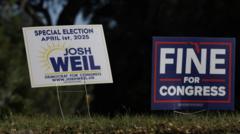As U.S. firms push for tariff changes to level the international playing field, the potential repercussions of President Trump's proposed tariffs raise concerns among businesses about retaliatory measures, impacting the broader economy.
Balancing Trade: America's Tariff Conundrum Amidst Presidential Proposals

Balancing Trade: America's Tariff Conundrum Amidst Presidential Proposals
The complexities of U.S. trade policy, as President Trump's administration considers tariffs on European goods, reveal deep-seated frustrations among American companies grappling with international competition.
The grocery aisles across the United States are filled with European imports, including jars of St Dalfour strawberry spread and Bonne Maman raspberry preserves, which contribute to over $200 million in jams imported from Europe yearly. However, American-made jelly struggles to find a foothold in European markets, with exports totaling less than $300,000 annually - a disparity that JM Smucker, a leading American jam producer, attributes to the EU's steep import tax exceeding 24%. In a recent letter to the White House, the company urged the Trump administration to implement "reciprocal" tariffs on EU products to create fairer competitive conditions, as the highest U.S. tariff sits at just 4.5%.
Trump's broader strategy to enforce tariffs against trading allies has ignited mixed reactions, provoking discontent and confusion while economists caution against potential price increases and economic strain. While some American businesses have echoed concerns over the looming tariffs, others channel their frustrations into seeking redress for perceived inequities in foreign trading policies. Their appeals, including one from apple farmers regarding disparities in tariffs with nations like India (50%) and Brazil (10%), as well as concerns about digital taxes in Canada and Turkey targeting U.S. firms, reflect a broad-spectrum of trade-related grievances.
Despite Trump branding his forthcoming tariff plans as “Liberation Day,” there is notable skepticism within the business community regarding a strategy perceived as impulsive, particularly in light of the potential for retaliation and escalation into a trade war. With a critical deadline approaching on April 2, uncertainty looms over the administration's objectives. Trump's recent remarks, juxtaposing nicety with the threat of severe tariffs on foreign automobiles, suggest a complex and sometimes contradictory approach to trade policy: "Some days it's about revenge and just equalizing things."
As nations like India consider reducing tariffs to engage in negotiations, observers worry that Trump's unpredictable tariff approach might yield unsatisfactory outcomes for businesses hoping to leverage these measures for more favorable terms in the long run. The delicate interplay between businesses advocating for tariffs specifically tailored to their interests, while also expressing concerns about the sweeping implications of Trump's proposals, complicates the narrative.
For instance, NorthStar BlueScope Steel expressed desires for additional tariffs on steel and aluminum parts, while simultaneously seeking exemptions for essential raw materials like scrap metal. JM Smucker and other food manufacturers highlighted the dangers of overarching tariffs, which could inflate costs for importing essential ingredients, such as cocoa. This reflects an emerging preference for a measured approach to trade policy rather than an all-out tariff imposition.
Wilbur Ross, former commerce secretary under Trump, maintains that the businesses’ apprehensions may subside as the administration's tariff plans crystallize, marking April 2 as a pivotal point in U.S. trade strategy. Nonetheless, he noted Trump's unwavering commitment to using tariffs as a mechanism to generate revenue and boost domestic manufacturing, a proposition resonating with Republican lawmakers, traditionally champions of free trade. Representatives like Jodey Arrington argue this approach is essential in restoring competitive balance globally, emphasizing that fighting for American producers is a fundamental obligation that ultimately benefits all involved.
In summary, as the Trump administration navigates the delicate landscape of trade tariffs, the intricacies of balancing national interests with potential global repercussions remain a paramount concern for American businesses striving for equitable practices in the face of foreign competition.






















